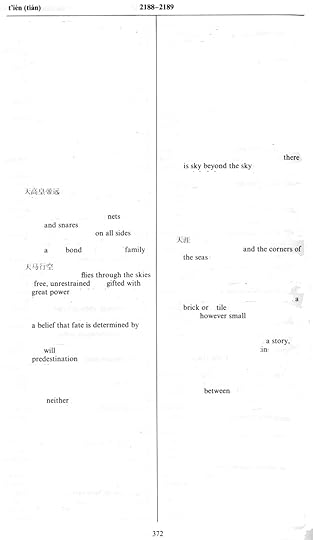Yilin Wang's Blog
December 19, 2024
Translation: Fei Ming’s “the nineteenth night of december”
Today I’d like to share a translation of a poem by Fei Ming on my blog. I translated this poem years ago after first encountering Fei Ming’s work but didn’t end up including it in my anthology. Since it’s titled “the nineteenth night of december,” I figured I’d release it as a bonus translation on December 19th. Hope the poem brings folks some warmth on winter nights!
十二月十九夜
废名
深夜一枝灯,
若高山流水,
有身外之海。
星之空是鸟林,
是花,是鱼,
是天上的梦,
海是夜的镜子。
思想是一个美人,
是家,
是日,
是月,
是灯,
是炉火,
炉火是墙上的树影,
是冬夜的声音。
the nineteenth night of december
By Fei Ming
Translated by Yilin Wang from the Chinese
in the late night, the lantern
is like the songs of lofty mountains and flowing waters,
a sea beyond the physical self.
the realm of stars is a forest of birds,
is flowers, is fish,
is the dreams of the sky above.
the sea is a mirror for the night.
contemplation is a beautiful person,
is home,
is the sun,
is the moon,
is the lantern,
is flames.
flames are the shadows of trees on the wall,
the melody of winter nights.
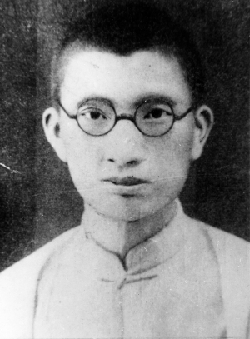
Fei Ming 废名 (1901–1967) was an influential modern Chinese poet, short story writer, novelist, and essayist, and a member of the Yǔ Sī Sè 语丝社, a literary group founded by Lu Xun 鲁迅 and Zhou Zuoren 周作人. He was the author of various poetry books, short story collections, and novels, including Mirror《镜》, The 108 Stories of the Bamboo Grove《竹林的故事》, and Bridge《桥》. Fei Ming’s work was deeply influenced by Buddhism, Daoism, and different schools of Chinese philosophy.
If you enjoyed reading this poem, you can tip me on ko-fi to support my translation work, so I can make more pieces such as these publicly available. In light of various barriers I have experienced when dealing with the traditional publishing industry, I’m experimenting with different modes of sharing my translations (including on my website), to identify the best approaches that would allow me to preserve the integrity of my work as it is meant to appear.
For more translations of Fei Ming’s poetry, an essay on translating his work, and more translations of poetry by modern and contemporary Chinese poets, please check out my debut book The Lantern and the Night Moths. You can also support my work by requesting your local library to order it, which helps make it available to folks who may not otherwise be able to access it.
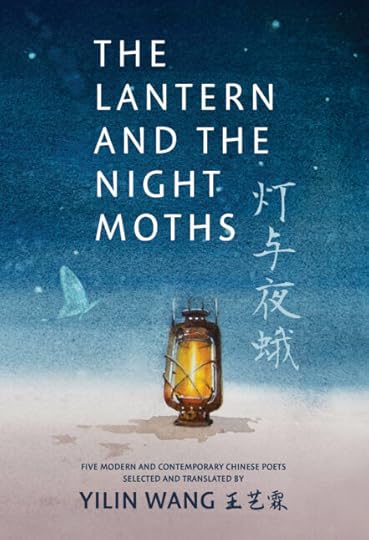
November 30, 2024
2024 SFF Awards Eligibility Post: poems translated into and written in English
It’s that time of the year again for award eligibility posts.
The main project that I published this year is The Lantern and the Night Moths (Invisible Publishing 2024), my debut book of translated Chinese poetry and original essays on translation, which recently won the John Glassco Translation prize from the Literary Translators Association of Canada. It’s the first book of translations from Chinese or from any Asian language to win the prize in its 40 years of history.
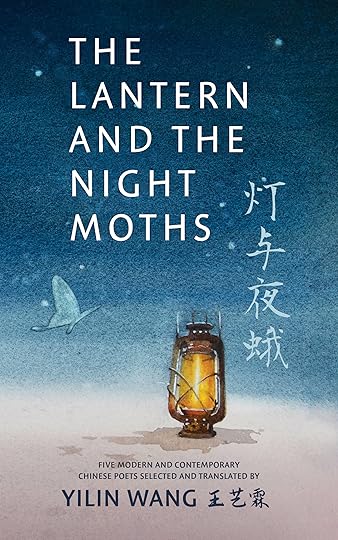
The book includes my translations of some speculative poems first published in 2024. They are eligible for nomination for awards like the Rhysling Award, Dwarf Star Awards (my translation of Xiao Xi’s poem won the award for 2023), and the special Hugo Award for best poetry being given out by the Seattle WorldCon in 2025. Here’s a list of my eligible translations:
“Dialect” by Zhang Qiaohui (11 lines)**“The Pagoda of a Thousand Autumn” by Zhang Qiaohui (12 lines)**“ nipping flowers ” by Fei Ming (11 lines) (2nd photo in the link)**“stars” by Fei Ming (10 lines)“I think” by Dai Wangshu (4 lines)**“To Answer the Visitor with Classical Imagery” by Dai Wangshu (12 lines)“For Jin Kemu” by Dai Wangshu (28 lines)**“Autumn Night Reflections” by Dai Wangshu (15 lines)**I am happy to send a digital file containing the above poems to anyone reading for speculative poetry awards. Just leave me a comment or email at yilinw[at]gmail[dot]com. The starred ones ** represent my personal favourites if you only want to read some of them.
Additionally, I want to draw folks attention to my poem “天涯 (tiān yá) the horizon,” which was published as a part of a series of white-out poems in the Spring 2024 (issue 117) of the UK literary journal Wasafiri. The poem is eligible for all the above awards along with the Aurora Award since I’m a Canadian citizen.
Please note this poem is an experimental white-out poem created from a page of Chinese-English dictionary and phrase book. It can be read across the page from left to right as well as column by column.
“天涯 (tiān yá) the horizon”
Thank you for reading and for considering my work.
November 13, 2024
The Lantern and the Night Moths Wins the 2024 John Glassco Translation Prize
I’m delighted and honored to share that my debut book The Lantern and the Night Moths recently won the 2024 John Glassco Translation Prize from the Literary Translators Association of Canada (LTAC). The prize is given annually to a debut translation into English or French by a Canadian translator. Notably, my book is the first work of translation from Chinese and from any Asian language to win the prize in the 40-year history of the prize.
Thank you to the LTAC, to the entire jury, and to Alina Doricheva (Ukrainian translator of San Mao), who helped the jury assess my translations of the Chinese texts. Thank you to my publisher Invisible Publishing, editors Kess and Chenxin, and everyone who helped make this book a reality.
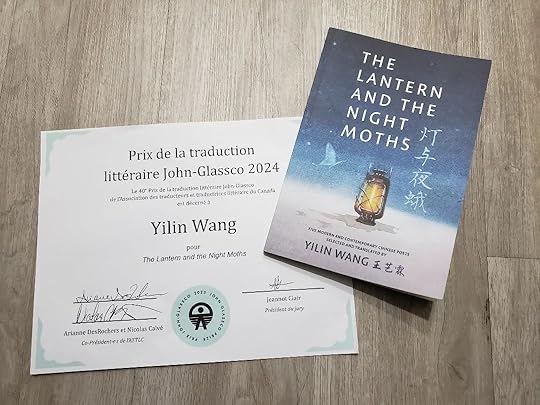
Here’s the jury’s citation in English:
“The Lantern and the Night Moths is an impressive undertaking: Wang has selected five deserving and startling poets and honours a complex tradition, language, and culture even while claiming space in a wider, English-language readership for Fei Ming, Qiu Jin, Zhang Qiaohui, Xiao Xi, and Dai Wangshu.
Wang’s renderings eloquently and faithfully convey tone, rhythm, and register, yet the translator-poet also walks confidently alongside the original poems and authors, expanding into the possibilities of the target language to better allow the images and evocations in the source texts to draw their English breath.
The short essays that accompany each selection are vulnerable, insightful explorations of the “powerful act of intimacy,” as Wang puts it, that is literary translation. An enormous amount of work has gone into this book and Yilin Wang offers up a translation that is both generous and responsible.”
— The 2024 John-Glassco Prize Jury: Jeannot Clair (chair), Susan Ouriou, Lida Nosrati, Katia Grubisic
For more info, see the announcement of the prize in Quill and Quire and Pancouver.
October 15, 2024
UK Distribution for The Lantern and the Night Moths
I want to make a short announcement here due to some issues with a bookshop in the UK.
My book The Lantern and the Night Moths was previously available through Lighthouse Bookshop in Edinburgh, Scotland and a pick for their Women in Translation club this year. However, they recently dropped it from their book club with no communication about what happened.
They stated it was due to the lack of stock availability, despite never even reaching out to me or my publisher about the stock. They claimed that they contacted my publisher but my publisher never heard from them. Also, they shared that they knew the book was going to reprint; if so, why not simply reschedule and move it to a later slot, instead of dropping it altogether?
Furthermore, in addition to dropping the book, the bookshop has left my name as a translator from the listing for a SECOND TIME. I had corrected them initially when the book club picks were announced and I literally fought the British Museum over their use of my work without credit or permission. Earlier this summer, when I contacted the bookshop about the Women in Translation club, since I was visiting Edinburgh to take part in the Book Fringe festilva, they also repeatedly ignored my emails.
Due to the above incidents, I am asking that folks DO NOT order this book or any of my other books through Lighthouse Bookshop, because of their repeated erasure of my work as a translator.
If you are based in the UK and was planning to read the book for the Women in Translation club, or want to check out this book of translated poetry, please consider ordering it through the wonderful Guanghwa Bookshop in London’s Chinatown. They are the oldest Chinese language bookstore in all of the UK. You can order the book by contacting them on social media or other channels.
If you are based in another region of the world, I try to maintain a list of recommended indie bookshops from which to get the bookstore here on my website.
June 21, 2024
Book News: The World of Cat Immortals
Hey folks, I have some book news to share! I have signed a contract with Aloha Comics to translate an art and poetry book entitled 《猫仙人的世界》 The World of Cat Immortals, created by the Xian Mao Li Jiang 仙猫狸将 arts collective. The book is forthcoming in 2025.
The book has some of my favourite elements: poetry, Chinese mythology, and of course, cats! To summarize the book in a sentence, I’d describe it as “Chinese immortals and deities from mythology reimagined as cats, accompanied by many short poems.”

For the wuxia fans out there, the Chinese book has been blurbed by Lee Chi-Ching 李志清, the acclaimed HK artist who drew the Condor Heroes manhua  (I’m still hoping someone would pick up that series too…)
(I’m still hoping someone would pick up that series too…)
Here’s a picture of the cover of the Chinese original.
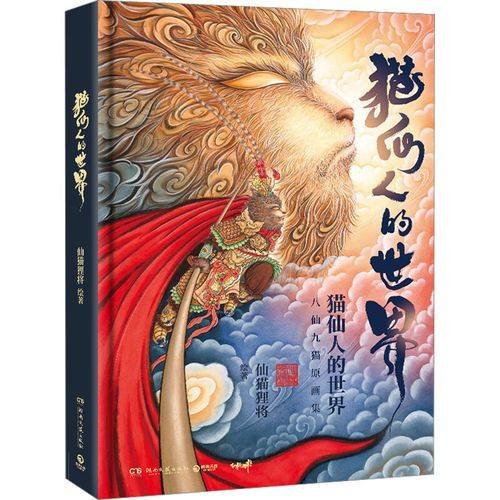
A link to the douban page which includes the book’s description in Chinese: https://book.douban.com/subject/36247021/
A link on xiaohongshu sharing some interior pages: https://xiaohongshu.com/explore/6430b7e50000000013003aee?xsec_token=ABD9oC6NWqAjE3uSaaTO10Nzx_rsSMjL4l2JS6bdK36nQ=&xsec_source=pc_search
I really look forward to working on this book and sharing it with you in 2025!
The post Book News: The World of Cat Immortals appeared first on Yilin Wang.
September 5, 2023
Where the Leaves Fall Published My Translation (and the Original Chinese Poetry) Without Contracts
The publication Where the Leaves Fall reached out to me to solicit a translation submission from me a while back. They followed up after their request in ONE DAY when I didn’t reply, asking for a submission, and I took time out of my busy schedule (while I already dealing with the stress of settlement discussions with the British Museum over copyright issues) to send them several poems to choose from.
In my very first email to the publication, I linked to this guide that explained how copyrights and contracts work for publishing translation, which clearly states specifically that permission is needed both from the copyright holder of the original AND the translation, and what to be careful of when drafting contracts for each. I also stated I could help facilitate the obtaining of permission, as in I can communicate with the poet and share a contract with the poet on their behalf.
However, Where the Leaves Fall never bothered to give any contracts to me or the poet (Xiao Xi) that I translate. Instead, they went directly to print after I sent the final poem they chose and author/translator bios and photos. They also didn’t show us proofs, despite the fact they were publishing the Chinese original, which they cannot read and have no idea if they’re displaying correctly.
I ask them to cease and desist in publishing our work, and to remove the poem/translation as well as our names from their publication. If you see copies of the magazine with Xiao Xi’s poem and my translation being distributed, please note that this was done without contracts and proper etiquette.
A similar incident happened earlier this year with another magazine, but the publication that went to print without contracts apologized and resolved matters with me and the poet, as well as learned from the experience and made steps to correct it in the future, which we greatly appreciate.
I am deeply disappointed in my experiences interacting with Where the Leaves Fall. They owe not only me, but especially the poet Xiao Xi, who they never gave a contract or proof (of the Chinese poem) to, a public apology. I feel their behavior is deeply unprofessional, and I stand by what I said. I also feel it is reckless, disrespectful, and racist to publish Chinese text that you cannot read without showing it to the poet/translator for approval, as this could have led to so many errors.
Going forward, the poets and I work with will be strictly enforcing the rule that we will not be signing any contracts retroactively for any publication, if our works are published without signed contracts already in place.
The post Where the Leaves Fall Published My Translation (and the Original Chinese Poetry) Without Contracts appeared first on Yilin Wang.
August 7, 2023
Statement on Qiu Jin’s Poetry Translations and the British Museum’s “China’s Hidden Century” exhibit
August 7, 2023
Statement on Qiu Jin’s Poetry Translations and the British Museum’s “China’s Hidden Century” exhibit
I am happy to announce that the British Museum and I have reached a settlement after they used my translations of Qiu Jin’s poetry in the “China’s Hidden Century” exhibit without permission, pay, or credit for over a month, and their later action of removing both my translations and Qiu Jin’s poetry from the exhibit.
On Tuesday, July 11, very soon after I officially obtained legal representation (thanks to the support of many folks who spread the word and donated to my Crowd Justice fund), the British Museum’s Director Hartwig Fischer reached out to me to make a proposal essentially matching the reasonable terms that I had proposed to them several times before launching my legal fundraiser.
I appreciate that the museum has come around. It is frustrating that this did not happen until I went through all the trouble to fundraise and obtain legal representation.
On the Reinstatement of Translations
As a part of the settlement, the British Museum has agreed to re-instate my translations of Qiu Jin’s poetry in the exhibition, with appropriate credit and professional payment, by August 11th (with the exception relating to the projection below). They have also obtained permission from me to create a spotlight page on their website featuring Qiu Jin’s poem “A River of Crimson.” I am glad that more readers will be able to see my translations, with credit given for the first time, and am glad that more visitors will be able to learn about Qiu Jin’s wonderful poetry.
There will be a delay in reinstating the projection of my translation of Qiu Jin’s poem “A River of Crimson” (满江红) at the physical exhibit. My translations were originally displayed with incorrect line breaks added without permission. I am still waiting for that to be fixed by the British Museum as much as possible and I appreciate their ongoing efforts to achieve this.
The British Museum’s Clearance Process for Translations
During this settlement process, I also learned that the British Museum currently “does not have a policy specifically addressing the clearance of translations.” It’s very surprising to me that such a large institution does not have such a policy. I hope that the British Museum follows through on their commitment to create a clearance process for translations in the future by the end of this year and to take concrete steps to ensure that the mistake does not happen again.
Donation of Settlement Funds
As I mentioned before in on my Crowd Justice fundraiser page, I plan to donate 50% or more of the settlement amount I receive to a cause to support translators of Sinophone poetry. The British Museum have agreed to make an additional payment to me matching their licence fee payment to enable this. I have reached out to a literary organization to propose a series of translation workshops for and led by BIPOC/racialized translators, where at least one workshop will focus on the translation of Sinophone poetry. I hope my donations can help fund a series of workshops with a focus on feminist, queer, and decolonial approaches to translation, in honor of Qiu Jin. I will give more updates about this once it has been arranged.
To Wrap Up
Thank you to everyone who has supported me over the past two months, which have been incredibly challenging. Thank you to my lawyers Jon Sharples, Aimee Gavin, and Alex Watt at Howard Kennedy LLP for all their help.
Thank you to everyone who has spread the word on social media, wrote letters, drafted and shared a petition, donated to the fundraiser, and reported on this incident in newspapers, podcasts, or other formats. Thank you to all the friends who supported me behind the scenes, and especially to all the organizers in ace and aro, queer, feminist, academic, speculative fiction writing, and translation communities who stepped up. I could not have done this without you.
This incident has showed me the power of the collective in holding institutions accountable. Let this be a lesson for the British Museum and other museums, organizations, and publications that permission must be obtained for the use of copyrighted translations, and that it’s important to always #NameTheTranslator and pay them professional fees for their work.
I am excited to finally be able to return to working on The Lantern and the Night Moths, a book of poetry translations that I was in the middle of translating when I discovered the British Museum’s use of my translations of Qiu Jin’s poetry in their exhibit. I look forward to sharing more of Qiu Jin’s verses with you all in the future.
Yilin Wang
Twitter: @yilinwriter
The post Statement on Qiu Jin’s Poetry Translations and the British Museum’s “China’s Hidden Century” exhibit appeared first on Yilin Wang.
May 27, 2023
Translated Poetry: “the infinite possibilities of trees” by Xiao Xi 小西
I recently had to deal with a very unfortunate and unprofessional incident where a Canadian literary magazine published a poem translation of mine without providing me or the author contracts to secure our written permissions before they went to print. The translated text was also published without the Chinese source text because they declined to do so.
I have decided to publish the original text and my translation on my own website here, in the form that the work is meant to appear. Please support our work by reading this approved version instead. Thank you.
It’s truly a delight to present the work of Xiao Xi 小西, one of my favourite contemporary Sinophone poets. Enjoy!
关于树的无数可能
小西
一棵树
有时是门,有时是床
有时是刀柄和菜板,弹弓和陀螺
有时是箱子,或者扁担
有时是一把琴,弹破了江山
有时是无数铁锹,掩埋了真相
有时是两个醒来的纸人
抬着棺木
去往天堂的路上,遇到了火
the infinite possibilities of trees
by Xiao Xi
translated by Yilin Wang from the Mandarin Chinese
a single tree
sometimes, it’s a door; sometimes, a bed
sometimes, a knife handle and a cutting board, a slingshot and a spinning top
sometimes, a storage box, or a carrying pole
sometimes, a lone qín, its chords shattering the kingdom’s rivers and mountains
sometimes, endless shovels, burying the truth
sometimes, two just-awoken people made of paper
shouldering a wooden coffin
on their way to heaven, they encounter bright flames
If you have enjoyed reading the above poem, please also check out my translations of Xiao Xi’s work in POETRY and Guernica. Xiao Xi’s work will also be featured in The Lantern and The Night Moths, an anthology of Chinese poetry that I have selected and translated, forthcoming in 2024 with Invisible Publishing.
If you want to support Xiao Xi’s work, you can donate to my Ko-Fi, and put a note that this is for her. I will pass along all donations as a partial payment for her translation permission fee while we wait for this unfortunate contract situation to be sorted out.
The post Translated Poetry: “the infinite possibilities of trees” by Xiao Xi 小西 appeared first on Yilin Wang.
May 3, 2023
Best Practices for Publishing Translations: Tips for Literary Magazine Publishers & Editors
As a translator who has published various fiction and poetry in literary magazines, both in print and online, in Canada and internationally, I often find myself in the position of having to explain how translation contracts, rights, and editing work over and over again to dozens of editors and magazines.
I have written this guide as a basic overview and resource to help assist editors and literary magazines I am working with who may be new to publishing work being translated into English in North America and beyond. This recommends knowledge I have gained working with other editors and translators, and I welcome feedback from other translators that expand this resource as well.
Disclaimer: this guide only provides general information based on my experience and is not legal advice. I am not a lawyer. Please seek out a lawyer for help with any specific legal questions or problems.
Translation Permissions/Rights
When publishing a translation of a work that has been translated into English, two rights are involved:1) The underlying right to publish an English translation of the source work (similar to adaptation rights).This comes from the rights holder of the source work (often the author, but sometimes, the estate, a publisher, or another party), unless the work is in the public domain.2) The publication right(s) for a particular translation created by the translator (e.g. first English world publication rights of the translation, or whatever the magazine normally requires from the English-language writer whose work it publishes).By default, this right belongs to the translator who created the translation, just as an author has the rights to their own writing.Both rights are exercised when the work is actually published (not when the translation is created), and therefore, need to be purchased by the party actually publishing the translation and using the rights.Before submissions/acceptance:For non-commissioned work (translations directly submitted by translators), it’s normally the expectation that the translator has confirmed with the original rights holder that the translation rights are available for purchase.Translators should not begin any work on a translation until they confirm the availability of the translation rights.When submitting a translation to a magazine, translators may include a letter from the rights holder that asserts the above.The letter has no standard format, but typically names the author, the titles of the original work/translation, and the specific rights (e.g. English translation rights) available. The letter may be in bilingual format and written by the translator as the original author might not speak English.It’s a good idea for literary magazines to request in their submission guidelines that a translator includes such a letter and leave room for it on the submission form, so a magazine can ascertain the availability of the English translation right when considering a piece for acceptance.After Acceptance/Publication contracts:Given that two rights are involved, it is a best practice that contracts are given to and signed by both the rights holder of the original work and the translator.The contracts for the original rights holder and translators should be specific in addressing each party as the rights holder and translator, and clarify the separate rights being obtained.Author Contract:This should be addressed to the original author, mention the original work, and refer to the English translation right(s) for any specific format needed (e.g. print, web, audio, etc), with the optional mentioning of any specific requirements like exclusivity or regions.In cases when the author/rights holder does not speak English, the translator may go in between the magazine and rights holder to help facilitate the signing.Translation Contract:The contract for the translator should only use language specific to translations (“The Translator” instead of “The Author”; “The Translation” instead of the “The Work”).Any “first publication” clause should refer to the first publication of the translation, rather than the original work, which often has already been published in the original language.This contract should not ask the translator for any rights that actually belong to the original rights holder and would not be within the translator’s capacity to assign (e.g. translation/adaptation rights for the original, any assertions about the original work as opposed to the translation).Sometimes, a magazine will treat the rights holder’s letter of permission as a contract, or ask for it to be updated to explicitly mention the granting of the translation permission to a particular publication.This is considered less formal, and it is up to the magazine to decide if this is sufficient and if they want to take that risk of not having a full contract with the original rights holder.Payment
It’s understandable that many literary magazines have limited budgets when it comes to pay writers/translators. However, both writers and translators are co-contributors and collaborators of any published translations.The best practice is to pay the original author/rights holder and translator both the full publication fee, to acknowledge each of their labor involved. This is much appreciated, and it is the magazine budget for this in advance if they want to publish translations.If the above is not possible, many translators (including myself) have an existing agreement with the original authors/rights holders we translate to split any publication fees received.However, forcing an author/translator to do this is an act of de-valuing translations and translators, especially since he translator is not only doing all the creative work that an original creator is doing, but also taking on the extra administrative labor that is involved in publishing a translation.The low payment and poor working conditions experienced by translators are well-documented by surveys and contribute to barriers for translators working in or looking to enter the field, especially marginalized translators.Likewise, if print or digital contributor copies are provided as a part of payment, both the translator and the original author/rights holder should receive that.Sending payment/contributor copies across borders: Please consult with the translator about the best way to get a fee or contributor copies to an author/rights holder. Be ready to spend some extra time on this as not every country accepts paypal or international bank transfer, and sending mail overseas can be complex.Editing / Proofreading / Publishing Translations
When it comes to publishing translations, it is more common for translated fiction and non-fiction pieces to be published alone without the original, while it can be quite common for poetry to be published in a side-by-side bilingual format.Always check with the translator upon acceptance as they may have a clear preference for how translations of poetry appear. They may have stated this in their submission letter.An anti-oppressive approach to editing should be practiced, especially when working with underrepresented translators, authors, and languages.When giving any editorial feedback on the translation, remember that the original text has already been published.The edits will generally be limited to copy edits related to style, word choice, translation decisions, clarity, and flow rather than substantive edits related to content, structure, or other bigger picture elements (which would require a discussion with the author/rights holder).Be sensitive about how translation decisions may be political and what impact they have. For example, the choice to italicize “foreign” words or not, the choice to translate/transliterate/footnote, assumptions about readership, etc.Remember that a translator should always be consulted in the same way a writer is consulted during the editing process. All edits should happen in discussion with the translator and this should be a process built on consent.If the source text is being published alongside the original, the original text should not be altered in any way without consultation with the original author/rights holder and translator.The original work is likely to have already been published and gone through an editing process, so there would not be any edits unless in exceptional circumstances.Be very careful when laying out non-English texts, and always put effort in ensuring the text looks exactly like the original submitted, including in terms of spacing, symbols, punctuation and other details.Do not make any assumptions about how the language works.For example, as a literary translator working from Mandarin Chinese, I have had line breaks changed, the character for “one” replaced with dashes, Chinese periods replaced with English periods, and other alterations added by editors who do not speak Mandarin, all without my permission. All of these are really inappropriate.Remember that there is a long, long history of many marginalized and underrepresented languages being made fun of, mistreated, and appropriated, so practice extra sensitivity here.If you have questions about the original text and its format, font, and design, consult with the translator sooner rather than later.Please give the translator ample time to proofread the original text, as it would need to be reviewed by both the original author and the translator. It can also be helpful to find another proofreader who knows the original language to review the proof as well.Acknowledging the Author/Translator
As mentioned before, the author and translator are collaborators and co-creators.Authors/translators should be equally acknowledged when a translation is published. This includes in the magazine, byline, table of contents, and also on social media, at events, in reviews, and so on.There is a #NameTheTranslator movement happening that urges more publications to be explicit about naming translators because they are often overlooked. This movement calls for putting a translator’s names on the cover of a book along with the author, and similar practices should be practiced by magazines.Likewise, when it comes any events, readings, or other promotional activities, the magazine should try to invite both the author/translator to take part where possible.Additional Resources:
PEN Model Contract for Literary TranslationsAuthors’ Guild Translator Book ContractSFWA Model Contract for Writers“Getting started in translation as an emerging translator” on the Translationista site#NameTheTranslator movementIf you found this resource helpful and would like to support Yilin’s work as a literary translator, you can buy them a virtual cup of tea on Ko-fi.
The post Best Practices for Publishing Translations: Tips for Literary Magazine Publishers & Editors appeared first on Yilin Wang.
December 31, 2022
Looking Back on 2022: A Year in Review
It’s New Year’s Eve today.
I’m writing this at my desk by the window, looking out onto an empty suburban street full of bare trees. It definitely still feels like the middle of winter here in Vancouver, but the days are slowing getting longer, and it’s a surprisingly sunny day, as if the sun is trying to cheer us up at the end of the year.
The past year has been a rollercoaster ride full of ups and downs for me, with lots of personal challenges like moving to a new apartment, recovering from COVID-19, and cutting ties with some toxic family members. I am also still mourning the death of my late Waigong, my grandpa who used to tell me many stories as a child and inspired my love of literature in the first place.
I want to take this time to look back and think about how far I have come this past year. I’m also really looking forward to turning a new page and ringing in 2023 tonight!
Here is a picture of the print publications that featured my writing and literary translations this past year:  Thank you so much to Flame Tree Press, CV2, The Puritan, Speculative Fiction Poetry Association (Rhysling Award), The Festival of Literary Diversity, and the League of Canadian Poets for publishing my original fiction, poetry, and nonfiction in 2022. Thank you also to POETRY, Room Magazine, Guernica, The Common, The Ex-Puritan, and TorDotCom Publishing for featuring my literary translations from Chinese and essays on translation.
Thank you so much to Flame Tree Press, CV2, The Puritan, Speculative Fiction Poetry Association (Rhysling Award), The Festival of Literary Diversity, and the League of Canadian Poets for publishing my original fiction, poetry, and nonfiction in 2022. Thank you also to POETRY, Room Magazine, Guernica, The Common, The Ex-Puritan, and TorDotCom Publishing for featuring my literary translations from Chinese and essays on translation.
Here are some of my favourite pieces of writing that I would love folks to check out:
“The Silence of Farewells” (short story) in the Asian Ghost Short Stories anthology (Flame Tree Press)“Moving, again” (poem) in the summer 2022 issue of CV2“A Sichuan Diaspora Daughter’s Kitchen” (poem) in the winter 2022 issue of The Ex-Puritan“Faded Poems and Intimate Connections: Ten Fragments on Writing and Translation” (lyric essay) written for the League of Canadian Poets’ National Poetry Month 2022 Blog SeriesAlso some highlights from my translations published this year:
Translations of Xiao Xi‘s and Fei Ming‘s poetry for the February 2022 issue of POETRY MagazineTranslations of Gu Shi’s and Ling Chen’s fiction for The Way Spring Arrives anthologySome other things I’m taking the time to remember and celebrate as this year comes to a close:
I was a finalist for the Aurora Award and nominated for the Rhysling Award for the first time ever in 2022.I won the Foster Poetry Prize with a very personal poem about moving, home, and belonging that I wrote in a very difficult time, which allowed me to experience a bit of a happy ending after a traumatic relocation.I signed a book contract as the editor and literary translator for my first book of translated modern and contemporary Chinese poetry. I’m so delighted and honored to be working with Invisible Publishing.I got to take part in a number of engaging literary events, festivals, and conferences this year, including speaking on a panel on Chinese literature at Beijing University’s Yenching Symposium and being a first-time moderator with AugurCon.After a hiatus during the last few years, I finally returned to magazine publishing as an editor again, joining the wonderful Tales & Feathers team as a co-editor-in-chief. I’m also super delighted to be guest editing an upcoming Wuxia/Xianxia Special Issue for Strange Horizons in 2023.And finally, I want to take the time to honor my personal creative milestones this year:
I was finally able to take a month off at the end of the year for a personally writing retreat, which allowed me to finally reach the half-way mark of the first draft of my poetry collection. It’s so nice to be able to find creative flow again.Thanks to a generous grant from the BC Arts Council, I was able to complete a year-long mentorship with author Larissa Lai and literary translator Gigi Chang, which gave me access to incredible mentorship from and community with other women of color that I never had access to during my MFA.Ever since my grandpa passed away, I have been spending a lot of time thinking about my childhood years with him, my relationship with literature, and why I write. I don’t have all the answers but I have been listening to the 10 hours of voice recordings I did with him interviewing him about his life, and it’s helping me remember why I got into writing and translation in the first place as well as rediscover my passion.In the past few months, I have been dedicating more time to independently studying and working to improve my skills in reading Classical Chinese. I launched a personal project to learn and memorize the #TangPoetry300, an anthology of roughly 300 Tang dynasty poems, which I hope will inspire my writing and translation work in the years to come.Overall, this has been a very busy and fulfilling year, and I’m really looking forward to 2023. Thank you friends and readers for all your support, and I wish you a happy new year!
The post Looking Back on 2022: A Year in Review appeared first on Yilin Wang.

